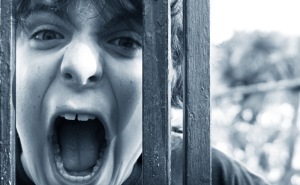Second Week of School Brings Problems to Light
As I noted in a previous blog post, my son, Bob, who has bipolar disorder and ADHD, made it through his first week of third grade—albeit with some problems. Last Monday—the first day of Week 2—I received my first phone call of the year from the principal.
Here we go again.
It seems Bob had been in the school cafeteria—which he has already denounced as being too loud—when, according to him, a classmate “pushed another kid’s head into my head and it hurt.” Several witnesses failed to corroborate Bob’s story. He was sentenced to an afternoon of in-school suspension (working in the office instead of the classroom) and lunch in the office for the rest of the week.
I knew a call to Bob’s psychiatrist was in order. I soon gleaned from our conversation that our new principal has little or no experience with a kid like Bob.
Although it may seem like Bob merely lied about the circumstances to make his attack look like self-defense, I really don’t think that’s the case. I mentioned last week Bob has been demonstrating signs of psychosis—sudden, irrational, paralyzing fear of who-knows-what and the constant perception of threat. I believe Bob thought his story was the truth, that the other kid was intentionally trying to hurt him, and he retaliated. Punishing him for “lying” isn’t effective when he believes he wasn’t.
Then there was the punishment, itself. I strongly doubt Bob considered ISS and banishment from the cafeteria deterrent from future incidents. Working alone in a quiet room is preferable to Bob. And being saved from the chaos and noise of the cafeteria? Sheer bliss. (When I mentioned Friday evening he got to return to the cafeteria this week, he replied “unless I get in trouble again,” almost as if he’s considering it as an option.)
 Unfortunately, “teaching mentally ill kids” is not on the core curriculum for most education programs. It should be. You can’t adequately teach my child if you don’t know how his mind works. A child with anxiety won’t be put off by removing them from an anxious situation. A child with ADHD won’t sit still if he can’t. Obviously we can’t give the impression negative behaviors are “okay” regardless of whether or not the child can help them—but is it really doing any good to hand out punishments that aren’t (to the child) all that bad?
Unfortunately, “teaching mentally ill kids” is not on the core curriculum for most education programs. It should be. You can’t adequately teach my child if you don’t know how his mind works. A child with anxiety won’t be put off by removing them from an anxious situation. A child with ADHD won’t sit still if he can’t. Obviously we can’t give the impression negative behaviors are “okay” regardless of whether or not the child can help them—but is it really doing any good to hand out punishments that aren’t (to the child) all that bad?
I responded by handing out sentences (literally, 25 run-on sentences for him to write about keeping his hands to himself and channeling anger) and calling the psychiatrist. She increased his Seroquel dose and I crossed my fingers. We’re close to topping out on both the Seroquel and lithium doses, and I’m not sure what Plan B will entail.
Fortunately, Bob did well the rest of the week, and I'm told he had "a very good day" today. I’ll be keeping my fingers crossed.
APA Reference
McClanahan, A.
(2010, August 31). Second Week of School Brings Problems to Light, HealthyPlace. Retrieved
on 2026, January 14 from https://www.healthyplace.com/blogs/parentingchildwithmentalillness/2010/08/second-week-of-school-brings-problems-to-light